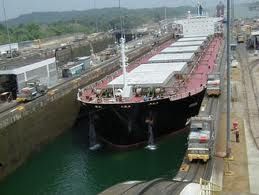
Rates for panamax dry bulk carriers on key Asian freight routes are expected to rebound slightly over the next week as intra-Asia coal activity drives a short-term recovery.
In the capesize market, rates are seen lower because of a slowdown in coal shipments to China and India, shipbrokers said on yesterday.
The rate of panamax vessels travelling via the transpacific route fell to US$8,375 on Wednesday from US$9,286 last week.
The market dropped to a five-month low of US$8,372 on Tuesday.
Rates seem to have bottomed out in the short-term and experts expect the market to rebound on rising intra-Asia coal trade.
'Rates in the Pacific basin showed some signs of stabilisation and we noticed more fresh enquiries for first-half August dates,' said broker firm ICAP.
'Looking at the cargo distribution, Indonesian coal remains the main driver but we see also an increased cargo volume out of Australia.'
BHP Billiton, the world's biggest miner, reported a faster-than-expected recovery in production of steel-making coal from its flood-hit collieries in eastern Australia but warned that it will take the rest of this year to return to full production.
Chinese thermal coal imports were expected to stabilise at around 100 million tonnes a year instead of rising, as previously expected, because of improvements to the country's own coal output and rail capacity.
In the supramax market, freight rates from the east coast of India to China fell to a fresh two-and-a- half year low of US$8,716 from US$8,971 last week as the monsoon season continued to dampen exports.
The market was expected to remain in the doldrums until at least September when the monsoon eases, allowing for some iron ore shipments to resume.
The rate for shipments from Australia to Japan and South Korea, two major coal importers, tumbled to US$9,468 a day from US$9,518 last week. The market hit a five-month low of US$9,390 on Monday.
Benchmark capesize fixture rates from Australia to China eased to a one-month low of US$7.750 a tonne on Wednesday from US$8.012 last week on waning freight demand.
'Dry bulk shipping demand growth is beginning to slow particularly for iron ore into the EU and coking coal into India and China,' said Douglas Mavrinac, analyst with Jefferies & Company.
The Baltic Exchange's main sea freight index fell for the ninth straight session, declining two points or 0.15 per cent to a two-month low of 1,328 on Wednesday.
The overall index has traded between 1,300-1,500 points this year, coming under pressure as ship oversupply outpaces demand.
Technicals indicated the index would seek support at 1,277, and resume a short-term uptrend towards 1,500 thereafter.
Rates for the Brazil-China route fell to a two-month low of US$19.558 a tonne from US$20.254 last week.
Source: Reuters
We use cookies to improve your experience. By continuing to use our site, you accept our Cookies, Privacy Policy,Terms and Conditions. Close X